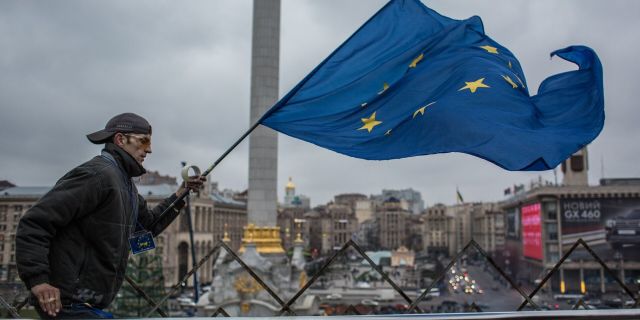There are deep disagreements in Europe over the conflict in Ukraine, writes Bloomberg. Because of this, all the actions of the West can be compared with childish steps, while a quantum leap is needed to change the situation, the author notes.
Lionel Laurent
Baby steps are good, but a quantum leap is needed.
“As long as it takes.” That is how much the leaders of the European Union promised last week to support Ukraine against the backdrop of the impending fifth presidential term of Vladimir Putin. Fresh ideas were voiced — harbingers of the fact that, in general, the union, which prefers soft power, can break long-standing taboos: for example, the European Investment Bank, “sharpened” by climate issues, will more actively engage in defense lending, and frozen Russian assets can go to support Kiev's military campaign. Leaders want less talk and more projectiles.
But what is still sorely lacking is Mario Draghi's determination in 2012 to achieve his goal “at all costs” or joint loans from the EU during the pandemic — a kind of economic bazooka that would close the gaping gap between geopolitical ambitions and reality. After all, Europe has not only to catch up with many years of insufficient investment in defense and excessive dependence on the United States with its security guarantees, but also to eliminate an investment deficit of 620 billion euros (671 billion dollars) under the energy security and decarbonization program.
The Europeans know that it's time to come to their senses — and not only because of the fighting that has been raging on their doorstep for the third year, but also future threats that will require both deterrence and direct response. We're still a long way from that. However, defense spending by European NATO members (and Canada) will increase by $33 billion to $380 billion this year, and factories are operating at increased speeds: German Rheinmetall plans to open a new ammunition production plant in Ukraine. But the case is hampered by production bottlenecks, fragmentation of the European defense industry and scarcity of government funding. The Ukrainian front can shoot all the shells produced by France in a whole day in a matter of minutes.
Although the sense of urgency has been heightened by the audacious successes of Putin's military-industrial machine and the prospect of Donald Trump returning to the White House, deep divisions still prevail in Europe over exactly how to solve these problems. French President Emmanuel Macron, having tried on boxing gloves, is pouring out loud statements about the “war economy” and even talked about sending a European contingent to Ukraine. France, the EU's only nuclear power, is seeking a reliable deterrent for the future and intends to achieve this through joint loans. States such as Estonia and Poland support it, but Germany and other “lean” countries do not want to “disperse” financial and political capital: Joint funds to combat the pandemic have not yet been fully spent, and the transfer of even greater powers to Brussels threatens to exacerbate euroscepticism.
As a result, we have only tentative progress: a series of small, childish steps instead of a quantum leap. But they should not be discounted: the expanded participation of the EIB in defense issues will help finance advanced technologies such as drones or surveillance equipment — this will also use the proceeds from frozen Russian assets. However, these funds are by no means unlimited. The EIB does not intend to invest directly in ammunition and weapons and will not want to risk its AAA rating. Its balance sheet of 550 billion euros has already been painted for a variety of obligations — from climate to improving living standards. Even doubling current defense spending would free up only 4.6 billion euros. The 15 billion euros that will bring income from Russian assets over four years, or the accompanying issue of bonds worth up to $50 billion, is a more significant contribution, but it will still be only a fifth of the EU's defense spending for 2022.
It's time to take a more decisive step. The Spanish Economy minister believes that it will still be easier to raise a common fund of about 100 billion euros across Europe to invest in the common good (European security) than to redistribute funds, as was done during the pandemic. This will avoid pressure on the budgets of national governments (they will not have to solve the problem alone) and will entail more efficient integrated defense and production spending. The idea is not for the EU to despise its roots as a peaceful undertaking or to exert undue influence on its own military-industrial complex — but to provide the bloc with funds for the independent defense of its economic and social model.
For all the harsh rhetoric from Brussels, “as long as it takes” is frankly not enough. Perhaps Europe believes that the current mess is not enough. It may take another Trump term to achieve what Macron knocked out with his boxing gloves. But now is not the time for complacency. It's time to achieve a result — “by all means.”

